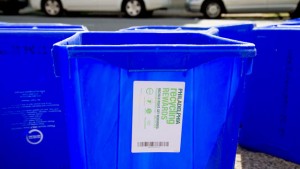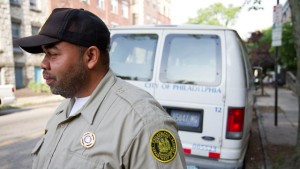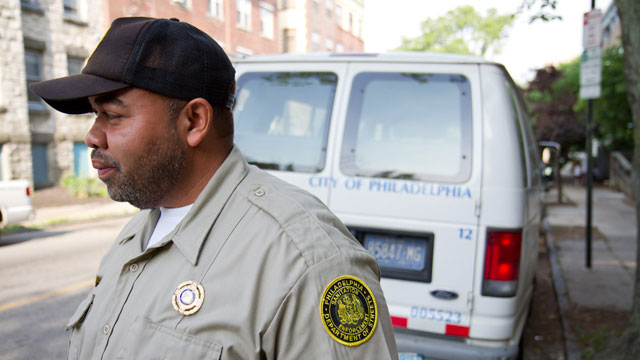“This is one of the better neighborhoods for recycling,” Taylor said. “They have more of a clue of what’s supposed to be in the bucket. Some other neighborhoods, they don’t have a clue.”
It’s hard to blame residents for being confused.
It used to be that people had to separate their recyclables: cans in one bucket, glass in another, and so on. Then the city rolled out “single stream” recycling: just one big blue bin for all recyclables.
“People just didn’t know what was recyclable,” says Carlton Williams, the deputy commissioner of the Streets Department. “People said, ‘I’m confused, I’m not going to figure it out anymore, I’ll just throw it in the trash.’”
Philadelphia was the first city in the country to enact mandatory curbside recycling in 1987, and it’s one of the toughest laws in the nation.
Other cities like San Diego and Seattle have followed suit, but Philadelphia’s recycling rates were low for years.
So when mayor Michael Nutter took office in 2008, he got serious. The city started picking up recycling each week, instead of once every two weeks. It added plastics and cardboard to the list of acceptable items. It spent millions of dollars on trucks, bins, advertising and education.
Philadelphia had a good incentive: it could earn money selling recyclables, while saving money on high tipping fees for hauling rubbish to landfills or incinerators.
“We’re at an all time high of $65 a ton for recycling for the city of Philadelphia. That is phenomenal. We’re paying $66.50 a ton when we throw things away as trash,” says Williams.
To keep garbage costs in check, and to cash in by collecting more recycled material, the city sent dozens of city workers out roaming the streets, and they began hitting scofflaws in the pocketbook.
That’s where Kerry Withers, a SWEEP officer, comes in.
“Sweep stands for Streets Walkways Education and Enforcement Program,” explains Withers.
In other words, he’s the trash police.
“If we see most of the people have blue bins around here, what we’ll look for is somebody who doesn’t have one and that prompts us to check if they’re recycling or not,” says Withers, as he snaps on blue latex gloves and walks up to a house, its front yard groomed with flower beds.
 “Like right here, you have your soda, your plastics, inside of the trash,” says Withers, opening black trash bags. “You have your cardboard right there that’s not flattened down.”
“Like right here, you have your soda, your plastics, inside of the trash,” says Withers, opening black trash bags. “You have your cardboard right there that’s not flattened down.”
Withers walks up to the home owner, Thessalonia Sharpe, who comes out to her porch.
“You just got to let me know that you’re going to recycle. That’s all I need to know,” he says to her.
“I’m trying,” says Sharpe. “I’m just cleaning out my basement, I thought that was all cardboard paper and stuff like that.”
“All your cardboards should be broken down,” he instructs her.
This time Withers gives Sharpe a warning, but he regularly writes $50 tickets for people who don’t recycle.
Some Philadelphia residents have paid thousands of dollars in trash and recycling tickets, including property owner Jacquie Stevens.
“Otherwise known as Madame Trash. That’s how I feel,” says Stevens. “I’m a landlord in the city of Philadelphia, regretfully.”
Stevens owns 13 properties, which means she’s responsible for all the recycling misdeeds of those 13 properties. She says digging through her tenants’ trash is a violation of their privacy.
“I put up a no trespassing sign. Doesn’t make any difference to them. They’re on the hunt for money. Like a gambler went mad, you know?” says Stevens.
Since January of 2010, Philadelphia has issued about 24,000 tickets.
Though Philadelphia’s approach to getting people to recycle might anger some, it clearly has worked.
“We’ve been averaging about 9900 tons a month [of recycling material], which is an all-time high,” says Deputy Commissioner Williams.
Between the money not spent in landfill fees and the money earned selling recycled materials, the city is realizing a net savings of about one million dollars a month.
Hoping to get those numbers even higher, the Streets Department has now dangled a carrot in front of residents, a coupon rewards program http://www.phillyrecyclingpays.com/recycling-rewards-detail.asp for anyone who recycles. The program is too new to tell whether it’s any more effective than writing tickets, but it’s bound to be more popular.
 Bright blue recycling bins neatly line 45th Street on Philadelphia’s west side. William Taylor, a recycling truck driver and a reverend, treats his routes kind of like a recycling ministry, doing whatever he can to get people on board.
Bright blue recycling bins neatly line 45th Street on Philadelphia’s west side. William Taylor, a recycling truck driver and a reverend, treats his routes kind of like a recycling ministry, doing whatever he can to get people on board.
